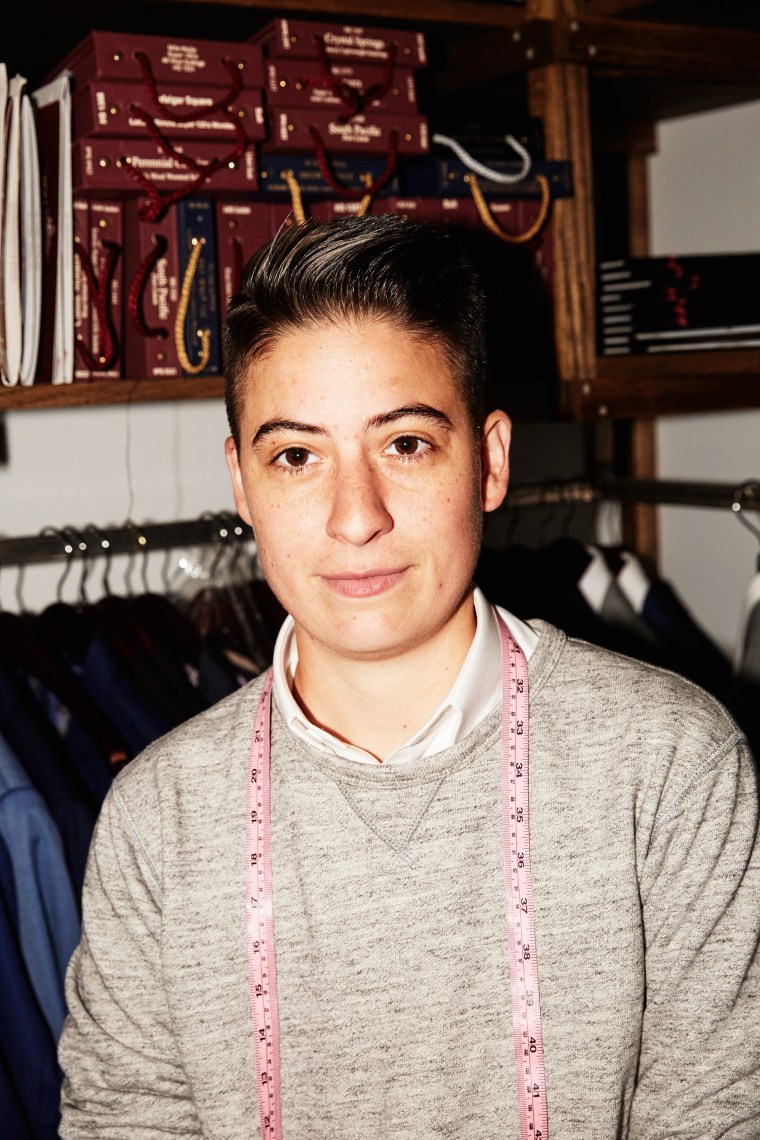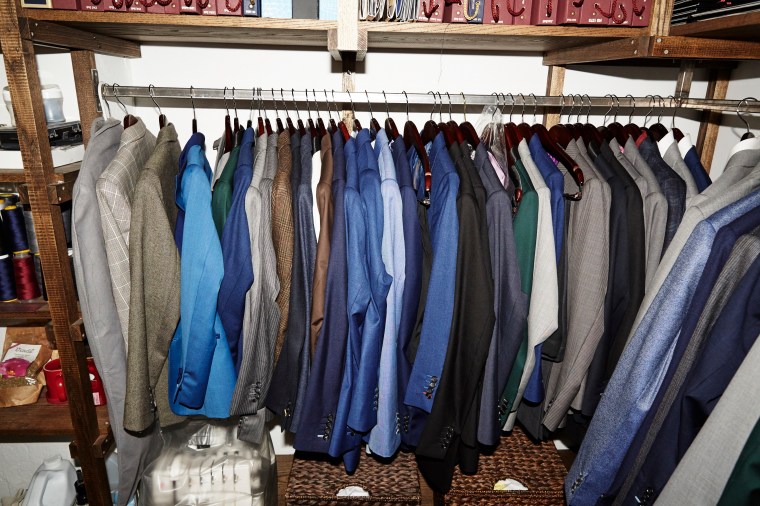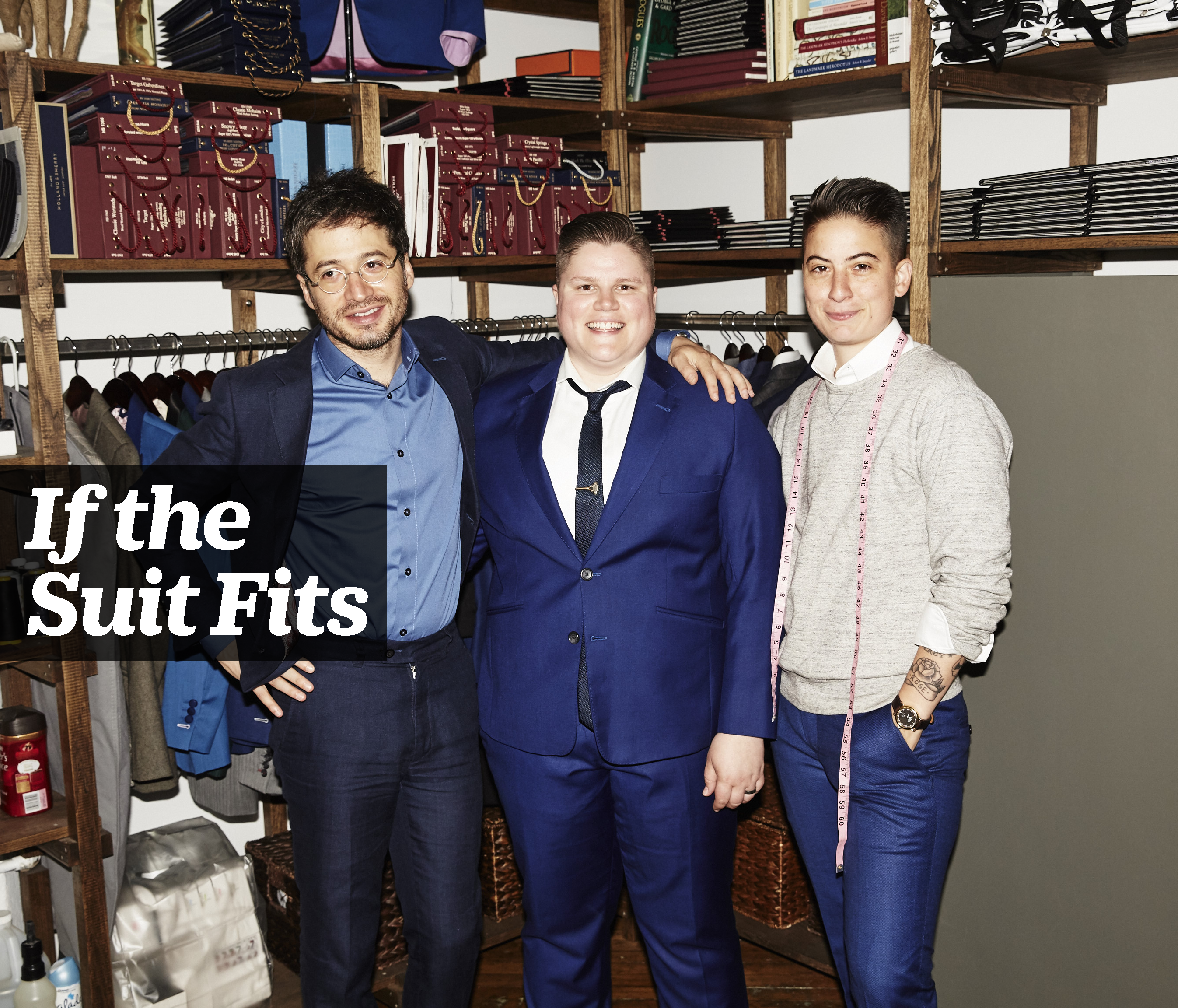
A new documentary about a custom suiting company for gender nonconforming people proves that clothing is about much more than fashion
Rae Tutera remembers getting a custom-made suit for the first time.“It’s a very fuzzy memory,” says Tutera. “I was in a dressing room in a menswear store and the tailor was waiting outside to see me. I had no rubric for how I should feel or what I should look like, so I was bewildered on a private level, because I didn’t know who I was or what my expectations were. And on a practical level, I was like, I don’t know how a suit should look.”
Tutera’s bewilderment stemmed from the fact that Tutera had never owned a suit that fit right. In fact, Tutera, 25 at the time, hadn’t been comfortable in clothing since the pre-pubescent days of basketball shorts and t-shirts. The last several years have seen rising awareness of many of the issues facing the transgender community, including higher rates of suicide and the increased risk for violence motivated by hatred. But there’s another challenge many trans people experience that doesn’t get nearly as much attention: the simple fact of waking up every morning and getting dressed.
It may seem trivial if you’ve never brushed past rack after rack of clothing at a department store, only to find that no garment appears made for your body. Or if you’ve never put on a pair of pants that accentuate your hips when those hips feel incongruous with your own identity. But for people on the trans spectrum—or for anyone who identifies as nonbinary, androgynous or otherwise genderqueer—the problem of clothing runs much deeper than fashion.
Enter Bindle & Keep, a Brooklyn-based custom suiting company that serves gender nonconforming clients and in which Tutera, now 31, is a partner. Tutera and the company are the subjects of a new documentary, Suited, which premieres on HBO on June 20. The film, directed by first-time filmmaker Jason Benjamin and produced by Lena Dunham and Jenni Konner, follows Tutera, partner Daniel Friedman and several of their customers as they embark on the process of procuring a suit, as Tutera says in the film, “that makes them feel as good as they deserve to feel.”
It was Tutera’s custom suit, however imperfect, that planted the seed that would grow into Bindle & Keep. “It wasn’t so much having the suit as it was that the suit introduced me to my body and made me treat myself differently every day,” Tutera explains. At around the same time, Tutera noticed that the suits worn by Murray Hill, a drag king Tutera had been following for years, began to fit him better. A bit of research led to the tailor behind Hill’s transformation: Friedman, whose clientele at the time was largely of the Wall Street variety.
Tutera badgered Friedman over email until he agreed to meet for a drink. Tutera expressed a desire to bring the transformative experience of custom suiting to others in the trans-identifying community and beyond, opening the tailor’s eyes to a customer base he had never before considered. He agreed to take Tutera on as an apprentice. Friedman’s model of measuring clients in their homes and offices translated well to the gender-nonconforming customers Tutera brought in early on. “He would teach me the measurements, and I would teach him how to talk to people that weren’t the familiar cis, straight folks that he knew,” Tutera recalls. “Daniel provided the tailoring service. I was providing the human service.”
In the beginning, Tutera’s aspirations were modest. “I felt like, I’m going to get this guy to teach me to make one person a good suit, and that one person will be less stressed out when they have to put on a suit, and that will be my one contribution to the universe,” Tutera says. “And obviously it turned into much more than that.”
A REALLY NICE AQUARIUS
Jason Benjamin wanted to be a documentary filmmaker, but after finishing his MFA, he needed a job. He became a union boom operator and landed a gig on the HBO show Girls. He didn’t know it at the time, but four seasons later, the women behind that show, Lena Dunham and Jenni Konner, would also be the women behind his first documentary.
Benjamin first came across Tutera’s story in a New York Times profile of Bindle & Keep in November 2013. He recalls being struck by its description of the particular moment when a person who has never had a suit that fit him tries on a garment custom-tailored to his body. “That was the moment that I thought was going to make the basis for a great film,” he says. “If we could get to know the characters before that moment, hoping for this person to be successful in that moment, then we’d have a great story to tell.”
Benjamin approached Dunham to gauge her interest in producing the project. It was an easy sell, given that Dunham and Konner’s production company, A Casual Romance, focuses on projects that, in Dunham’s words, “push the ball forward on gender and diversity and support voices the way that our voice has been supported.” They agreed to make a short documentary, to be completed in just three days of shooting and three days of editing. The results of that footage would soon convince HBO that the subject warranted feature-length treatment.

But first Benjamin had to get his subjects on board. He emailed Tutera in December of 2013 and they arranged to meet for dinner in Brooklyn. Tutera was skeptical at first. “I didn’t necessarily expect him to be sensitive and informed enough to handle the subject matter,” Tutera says. “I also didn’t expect him to have the resources to make a film.” When they met, Tutera texted their then-fiancée, as Benjamin paraphrases, “to let her know that [I wasn’t] some psychotic killer.”
Benjamin quickly realized Tutera wasn’t joking. “It was a check to myself of the kind of violence that people form the nonconforming community very often have to confront,” he says. Thankfully, Tutera got a simultaneously “brotherly and maternal vibe” from the filmmaker. The text to Tutera’s fiancée? “He’s a really nice aquarius. Everything’s going to be fine.”
THE CLOTHES MAKE THE MAN
Derek Matteson was engaged to be married when he submitted an online inquiry to Bindle & Keep. As he would tell Friedman and Tutera during their first meeting—which would take place on-camera—his main priority for his wedding-day suit was neither its color nor its lining nor a monogrammed inner pocket. Rather, as a trans guy, he wanted to look as masculine as possible. He told his new tailors, “I really don’t want anybody to be able to pick me out from a line of guys and be like, there’s curves on this body that don’t make sense.”
Like Derek, many of the subjects in Suited are preparing for a major event in their lives. There’s Aiden, a 12-year-old transgender kid from Arizona who needs a suit for his Bar Mitzvah; Everett, a young transgender man who’s graduating from law school and needs a suit for interviews; and Jillian, an attorney and the documentary’s sole trans woman, who wants to look her best when she delivers oral arguments in a transgender rights case before the U.S. Court of Appeals for the Eleventh Circuit.
“When we chose our characters, I wanted there to be some stakes at play in their lives that would allow us to craft a narrative around,” Benjamin explains. But some subjects came to Bindle & Keep simply because they decided it was time to own clothes that made them feel good in their own skin. And that, says Tutera, can be just as momentous as the kind of milestones that precipitate a barrage of Hallmark cards.
“It doesn’t necessarily have to be an external juncture,” says Tutera. “It can be this internal, emotional juncture. Even if it’s just someone coming in being like, ‘I’m tired of wearing clothes that don’t represent me.’ That seems like a juncture, too.”
In the film, Benjamin uses the initial fitting as a launching pad to explore the paths that led these customers to Bindle & Keep’s industrial-chic studio near the Brooklyn Navy Yard. “The relationship between documentarian and subject is notoriously tricky,” says Dunham. “Jason went in from a place where it was more important that people be comfortable than that he capture the uncomfortable moment. It’s ironic, because prizing people above his filmmaking ultimately led to an intimate film.”
PROOF YOU CAN EXIST
Suited comes in the midst of a national conversation about the rights of transgender people to use the bathrooms that align with their identities—another everyday activity, like getting dressed, that can be anything but mundane for someone whose gender identity is regularly challenged by the society in which they live.
Though Suited doesn’t explicitly address issues like the bathroom bills, Dunham believes it’s inherently political in the way in which it explores identity. “Any time you talk about identity and what that can mean, you’re doing something political, even if you’re not literally talking about legislation or political buzzwords.” She adds, more directly, “This film allows people to realize that behind politics are people.”
Tutera agrees. “It’s an important moment to have stories like these told in a tender, respectful way, to have the humanity of trans-identified people show so obviously. I think it’ll be a comfort to people who are coming out or dealing with the backlash against trans folks.”

Bindle & Keep finds itself in increasingly good company when it comes to serving the gender nonconforming population. Tutera points to Duchess Clothiers in Portland, Ore., Saint Harridan in Oakland, Calif. and Sharpe Suiting in West Hollywood, Calif. as just a few examples of businesses with similar mission statements. But Tutera also hopes that the service becomes both more widespread and affordable. “I’d like to think that people who don’t live on a coast or in a city, people who aren’t middle-class or beyond, will have access to this.”
“The film is very important, but for me and the other subjects, it just reminds us of all the things that we need to do,” says Tutera, who hopes to travel to schools and meet with student groups to discuss the documentary. Though the existence of gay-straight alliances has helped young people to understand that sexuality is a spectrum, more conversation is still needed when it comes to understanding gender identity, Tutera says. “Kids need to be comfortable with the reality that gender is also a spectrum.”
Tutera points to Laverne Cox’s notion of “possibility models,” a term the Orange Is the New Black actress and transgender activist prefers over “role model,” and which signifies the idea that the path she chose is valid and open to everyone. “That’s what I’d like to think the subjects of the film are for young people,” says Tutera. “Just proof you can exist.”
